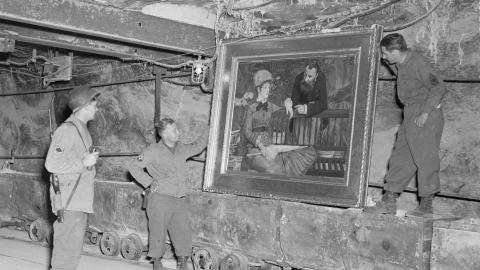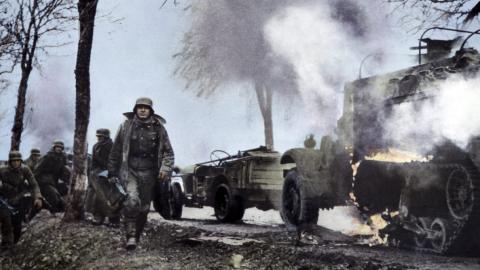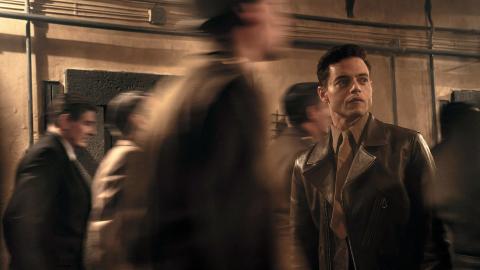British Home Front
The British regarded us [the GIs] as well-meaning but blundering intercessors whom they rather preferred to have on their island than the Jerries.
Holmes Alexander
In May 1940, Winston Churchill entered Downing Street convinced that the war could only be won through the complete mobilisation of Britain's civilian population. The British home front was as important as any battle ground. Throughout the war, the Ministry of Information (under Alfred Duff Cooper and later Brenden Bracken) tried to boost public morale through propaganda campaigns. It also frequently prevented (or at least delayed) the press from publishing information that would damage public spirits, such as photographs of bomb-damaged houses in poor parts of London.
The Home Guard, or 'Local Defence Volunteers', was formed on 14 May 1940, a response to the Secretary of State for War Anthony Eden's call for 'men of all ages who wish to do something for the defence of their country'. The Home Guard became a key plank of the strategy of civilian mobilisation. 1.5 million men rushed to join, convinced by the bleak international picture that a German invasion was on its way. Throughout June and July 1940 ordinary people made preparations for the expected onslaught, including the collection of scrap iron to make armaments and the construction of concrete pillboxes in suburban parks.
Women also played a crucial role on the home front, fighting a daily battle of rationing, recycling, reusing, and cultivating food in allotments and gardens. From 1941, women were called up for war work, including as mechanics, engineers, munitions workers, air raid wardens and fire engine drivers. More than 80,000 women joined the Women's Land Army, enduring tough conditions and long hours in isolated rural outposts in order to prevent Britain from being 'starved out'. In cities, the Women's Voluntary Service prided itself on doing 'whatever was needed', mainly providing support (and much needed tea and refreshments) to victims of the Blitz and those sheltering in Underground stations.
From September 1940, the Blitz - the sustained bombing of Britain by Nazi Germany - hit many towns and cities across the country, particularly London, Coventry and Hull. Beginning with the bombing of London on 7 September 1940, which went on for 57 consecutive nights, and lasting until 10 May 1941, more than 43,000 civilians were killed by bombing and over a million houses were destroyed or damaged in London alone.
While the Blitz spread fear, it also engendered a strong feeling of community and collective stoicism, through urban populations. As gas masks, air raid sirens and blackouts became part of daily life for many Britons, 3.5 million children were evacuated to the countryside, where they had very mixed experiences. As families waited nervously for news of loved ones serving on the front lines, a telegram from the War Office – which carried the news of the death or capture of soldiers – became a universally feared symbol of the tragedy and arbitrariness of the war.
Rationing was another unwelcome yet necessary fact of life. Before the war, Britain had imported 55 million tons of food each year; by October 1939, this figure had fallen to just 12 million. Not just food, but also clothing, furniture and petrol were rationed, helping to create a booming black market, which traded items such as petrol coupons, eggs, nylon stockings and cigarettes. Rationing would continue until 1954, when limits on the purchase of meat and bacon were lifted.
One of the most popular items traded on the black market was SPAM, brought to Britain by US soldiers. Yet the roughly two million American servicemen who arrived in Britain in preparation for the Normandy landings became renowned for more than their dubious canned meat. As the GI's became friendly with the local population, leaving a trail of broken hearts and a significant number of pregnancies in their wake, the English comedian Tommy Trinder famously referred to them as: overpaid, oversexed and over here.
Did you know?
In London, the people who ran the black market which emerged as a product of rationing were known as 'Spivs' . The Spivs' most popular products were nylon stockings, car and truck parts, alcohol, cigarettes, eggs and canned meat.















